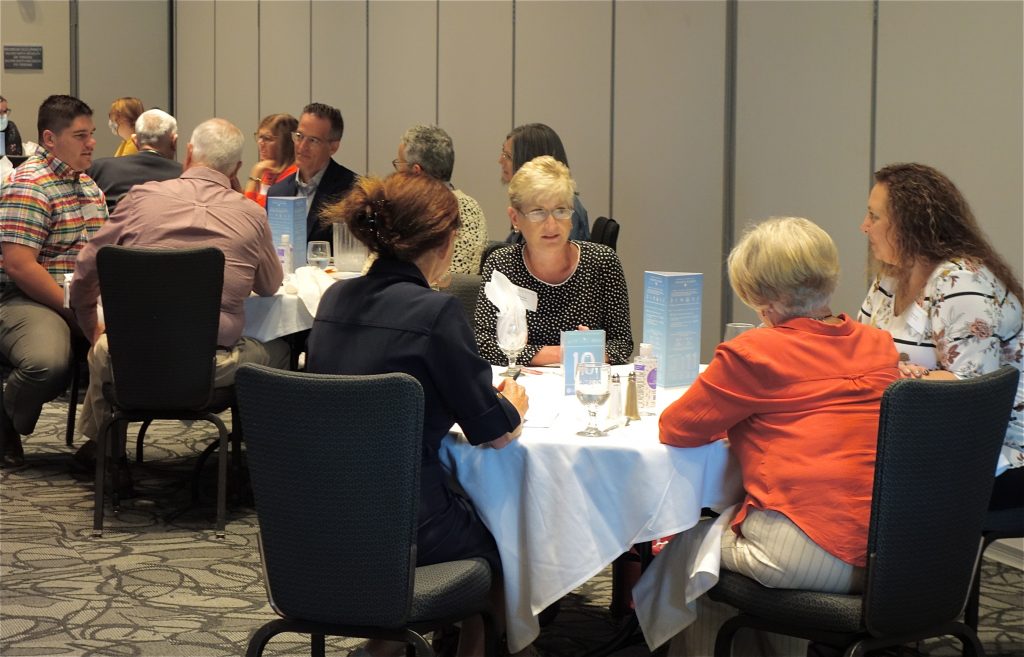September 14, 2021 // Diocese
Summit encourages Catholic business leaders to end poverty
Speakers at Catholic Charities’ recent Poverty Summit urged area Catholic business and organization leaders to help end poverty by taking their faith to work.
Nearly 80 leaders attended the lunch meeting Sept. 9 in the Walb Student Union ballroom at Purdue University Fort Wayne. The Catholic Charities office serving the Diocese of Fort Wayne-South Bend organized the summit around “Poverty at the Crossroads: The Church’s Response to Poverty in Indiana,” a pastoral letter Indiana’s Catholic bishops issued in 2015.
“Our hope is just that businesses really invest in their employees,” Nicole Kurut, Catholic Charities’ mission advancement manager, said during an interview prior to the event. “It takes the whole community sometimes to help each other reach our God-given potential.”
During the summit, Kurut shared information and a slide show about poverty in northeast Indiana and the challenges people face to escape it.
The level of poverty in the diocese is substantial, including rates in Adams and St. Joseph counties that exceed the national average, Kurut said. The effects of poverty land hardest on children.
Causes of poverty can vary from low pay and lack of financial knowledge to cultural biases, having no support system, or a traumatic event that leads to addictions or legal issues, she said.
Using statistics for Allen County, where the summit took place, she said one in five households earn wages that put them above the federal poverty level for their family size but leave them short of what they need to be self-sufficient economically.
Other examples provided on table centerpieces included:
— For a single parent with one preschooler and one school-age child, the parent must work full time at nearly $23 per hour, or about $48,000 annually, to be financially self-sufficient.
— In a two-parent household with a preschooler and one school-age child, the parents must work full time and earn a combined total of more than $26 per hour, or more than $55,000 annually, for the family to have economic security.

Photos by Kevin Kilbane
Nicole Kurut, mission advancement manager for the Catholic Charities office serving the Diocese of Fort Wayne-South Bend, discusses challenges facing many families during a presentation at the Poverty Summit for Catholic business and organization leaders. Catholic Charities organized the event Sept. 9 at Purdue University Fort Wayne.
Kurut said parents who work full time at minimum-wage jobs but need child care may have to spend about 80 percent of their income on their child or children’s care.
If parents work a second job to earn extra income to support the household, it pulls them away from their children and weakens the family, she noted.
Kurut closed with a short video featuring Autumn, a young woman in the diocese who has participated in Catholic Charities’ Education Creates Hope and Opportunity program. Autumn said the program encouraged her and assisted her with planning for the future after she became pregnant while in high school. She’s now the mother of a young son and has a job that supports herself and her child.
She concluded with this message: No one is “just an employee.” Workers all have family and other obligations that are important, too.
Business and organization leaders also heard a lot about three imperatives: “See,” “Judge” and “Act.” The Vatican and Indiana Catholic bishops use those three words to describe how business leaders and companies can reduce and prevent poverty.
Simply put, to “see” means one can’t go blindly through life doing what you do without considering the needs of others around him or her, said Father Mark Gurtner, the diocese’s vicar general. To “judge” involves making decisions to create products and services that are needed, lead to rewarding jobs for employees, and making good use of resources. To “act” calls people to take what they profess in faith and use it in how they act in business.
Society has created a throwaway culture in which many people are excluded or treated as outcasts, he said. The Catholic Church believes in the dignity of every human life, and that includes workers.
Business leaders are called to act in a way that increases the common good by building up individuals, families and society, he added.
Keynote speaker Brian Corbin, executive vice-president for member services for Catholic Charities USA in Alexandria, Virginia, reinforced that message during a talk presented by videoconferencing.
Corbin urged business and organization leaders to view their work roles as a vocation. That vocation includes contributing to building up society and reducing poverty.
Treating workers well benefits a business by improving factors such employee retention and morale, Barney Niezer, summit co-chairman, said during closing remarks.

Participants take part in a table discussion time during the Poverty Summit Sept. 9 for Catholic business and organization leaders.
Poverty summit participant Debra Stark Moser, vice president and regional sales manager for 1st Source Bank, said her company already assists employees in a few ways, including offering flexible work hours. Moser said the bank also is reaching out to address poverty in Fort Wayne by opening a loan office on the city’s south side. The office will provide financial education and loans for home buyers, agriculture, small businesses and other needs.
Most businesses operate at the 50,000-foot level until issues involving workers are brought to their attention, John Dortch, a Fort Wayne-based business consultant, small business owner and Poverty Summit planning committee member, said afterward.
Dortch encouraged business leaders to think about what he calls the “three Ts”: time, talent and treasure.
“With that,” he said, “give back.”
What business and organizational leaders can do
Poverty Summit participants received a handout noting barriers to workers’ economic self-sufficiency and how employers can help workers overcome them. Here are examples of best ways to assist workers.
Wages
Low pay leaves workers unable to provide for their families and working long hours keep them away from their family.
Suggestion: Pay just wages. A family of four in Allen County, Indiana, for example, needs to earn $26.14 per hour for economic self-sufficiency.
Health
Poverty can lead to health problems and higher death rates.
Suggestion: Offer counseling services or affordable healthcare policies.
Economic mobility
Families may earn more than the federal poverty level but less than the cost of living.
Suggestion: Help workers improve their income or careers by offering paths to earn skill certifications or by assisting with education costs.
Transportation
Difficulty getting to and from work can lead people to quit jobs.
Suggestion: Sponsor a ride-sharing carpool or provide an employee shuttle to hard-to-reach offices.
Child care
The cost can consume most of a minimum-wage worker’s pay.
Suggestion: Offer a dependent care flexible spending account or arrange an employee discount with nearby childcare providers.
Source: Catholic Charities in the Diocese of Fort Wayne-South Bend
The best news. Delivered to your inbox.
Subscribe to our mailing list today.






